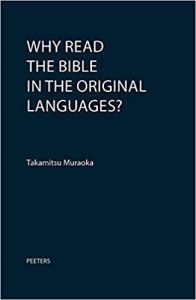MURAOKA, T. Why Read the Bible in the Original Languages? Leuven: Peeters, 2020, 111 p. – ISBN 9789042942004.
Uma comparação de várias traduções da Bíblia em qualquer idioma mostra que elas diferem em centenas de passagens, apontando para a discordância contínua entre estudiosos e tradutores da Bíblia em sua análise e compreensão dessas passagens. Aprender hebraico, aramaico e grego, as línguas originais da Bíblia, não é algo que agrada a todos. Além do que, o conhecimento destas línguas não fornece necessariamente uma solução para essas dificuldades. No entanto, há muitas coisas no texto bíblico que podem ser perdidas se o texto for lido apenas em tradução.
estudiosos e tradutores da Bíblia em sua análise e compreensão dessas passagens. Aprender hebraico, aramaico e grego, as línguas originais da Bíblia, não é algo que agrada a todos. Além do que, o conhecimento destas línguas não fornece necessariamente uma solução para essas dificuldades. No entanto, há muitas coisas no texto bíblico que podem ser perdidas se o texto for lido apenas em tradução.
Neste livro, uma série de questões linguísticas relacionadas com as três línguas originais são discutidas à luz de exemplos reais. Questões de cultura e retórica também são abordadas. Um capítulo especial é dedicado à Septuaginta como uma ponte entre os dois Testamentos. O livro foi escrito em um estilo não técnico, portanto, facilmente legível por não especialistas, mas os especialistas também podem encontrar coisas de seu interesse. Nenhum alfabeto hebraico ou grego é usado.
A comparison of multiple translations of the Bible in any language shows that they differ at hundreds of places, pointing to the continuing disagreement among Bible scholars and translators in their analysis and understanding of those places. To learn Hebrew, Aramaic, and Greek, the original languages of the Bible, is admittedly not everybody’s cup of tea. Knowledge of them does not necessarily provide a solution to these difficulties. However, there are not a few things in the biblical text which can be missed out if it is read only in translation. A range of linguistic issues touching on the three original languages are discussed in the light of actual examples. Matters of culture and rhetoric are also taken up. A special chapter is devoted to the Septuagint as a bridge between the two Testaments. The book is written in a non-technical style, hence easily readable by non-specialists, but specialists may also find things of interest. No Hebrew or Greek alphabet is used.
Quem é Takamitsu Muraoka?
Página do autor na Amazon.